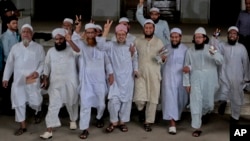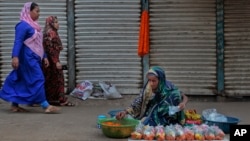The rejection Monday by Bangladesh’s High Court of a 28-year-old petition in which some secular activists sought to scrap Islam as the state religion of the country has sparked mixed reactions in the Muslim-majority South Asian nation.
A three-judge panel threw out the petition as soon as the case opened, saying that, having never been registered with the authorities, the secular group has no right to file any such petition to the court.
Leaders of the minority communities expressed disappointment after the court refused to hear the petition.
“It is sad that the court binned the petition without allowing the petitioners to present their arguments. This ruling will give a boost to the country’s Islamist forces and it is a sad day for all religious minorities in Bangladesh,” Rana Dasgupta, general secretary of the Bangladesh Hindu Buddhist Christian Unity Council, told VOA.
However, Islamist groups, which recently staged demonstrations and threatened a nationwide protest if Islam was dropped as the country’s state religion, say that they are happy with Monday’s ruling.
Leaders of the Islamist group Hefajat-e-Islam (Hel) said that the latest ruling will help curb the spread of anti-Islam ideologies in the country.
“Most Muslims in Bangladesh want Islam to remain the country’s state religion. If the High Court decided to scrap Islam as the state religion, Muslims across the whole country would have erupted in rage,” Maulana Anwar Hossain Rabbani, an HeI leader from Chittagong, said to VOA.
Islam Made State Religion
After Bangladesh won independence from Pakistan in 1971, it was declared a secular country.
In 1988, military dictator Hussain Muhammad Ershad declared Islam the state religion in attempt to seek mass support during a campaign by major political parties to oust him from power.
Soon afterwards, a group of 15 secular activists filed a petition arguing that recognition of Islam as the state religion conflicts with Bangladesh’s secular charter and discriminates against religious minorities.
Although Prime Minister Sheikh Hasina re-introduced secularism as the political standard in the country in 2011, she let Islam remain the state religion.
Last Friday, thousands of HeI activists took to the streets in Dhaka protesting against the High Court’s move to hear the petition. Jamaat-e-Islami (JeI), the largest Islamist party of the country, called for a day-long strike on Monday demanding rejection of the petition.
After Monday’s ruling came through, HeI and JeI leaders said the court was aware of the Muslim sentiment and so it chose to reject the petition.
“Ninety percent of the population of the country is Muslim. We knew that the government would not take the risk to scrap Islam as the state religion. We have been proved right,” Noor Hossain Qashmi, a Dhaka-based HeI leader, said to VOA.
He added that Monday’s ruling in no way poses any threat to non-Muslims in Bangladesh.
“Islam preaches Muslims to treat their non-Muslim neighbors well. The religious minorities in Bangladesh have not faced any discrimination in Bangladesh in the past decades while Islam has remained the state religion. They have nothing new to fear about now,” Qashmi said.
Ruling to Boost Islamists
Although Bangladesh’s state religion has been Islam, the constitution guarantees the practice of other religions in peace and harmony.
However, in recent times, Bangladesh has seen a series of attacks against religious minorities, atheist bloggers and foreigners. The Islamic State group claimed responsibility for most of those attacks. However, the government says domestic Islamist groups backed by the opposition parties are responsible for the attacks.
Monday’s ruling disappointed many religious minority leaders who believe it could encourage more Islamist attacks against minorities in the country.
“In their letters, the Islamists said to our church leaders that Bangladesh would be ruled by Sharia law. As they threatened to kill our leaders, in some cases they also said that only Muslims would live in Bangladesh,” William Proloy Samadder, organizing secretary of the Bangladesh Christian Association, said to VOA.
“Monday’s ruling has surely come as a shot in the arm for many of those Islamists. It is indeed frightening for all religious minorities.”





